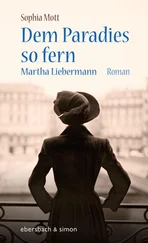“We haven’t met,”Susan says to Ruby.“I’m Susan Ferguson.”
Ruby has never been addressed in quite this tone.There is no inflection in Susan’s voice that would suggest she is speaking to a child.Con-fused, and a little thrilled, as well, Ruby looks up at the strange woman.
”Is this your house?”she asks.She holds her doll behind her back to hide it from Susan.
“Oh please, don’t remind me.Look.”She gestures toward the wallpaper, faded blue and dirty white, showing a repeated pattern ofa little girl in a pinafore holding a hoop through which jumps her dingy little dog.“Not to mention…”She points to the warped floorboards, then the copper-colored stains on the ceiling.Susan sighs, takes Ruby’s coat from her.“You know, at a certain point, you just give up.”She looks down at Ruby, gives her a curious little frown, as she wonders why this child seems so unresponsive.“Are you in school?”she asks.
The party is centered in what the Richmonds still call the ballroom, and, in fact, it is a room where dancing sometimes occurs—though now it is either raucous, sweating rock and roll, or the sacred, ceremonial steps ofApache rain dancers or Sufi dervishes, performers brought in by Susan.People are beginning to arrive, but Daniel is too nervous by now to do more than nod a distant hello to each ofthem.It is striking him with some force that coming to this party is a grave mistake.IfIris doesn’t show up, it will break his heart, his indelible disappointment will show like blood on a sheet.Ifshe does appear—then what? How will he be able to keep away from her?
He stands, with Kate, near the fireplace where four-foot white birch logs are smoldering.The brick wall ofthe hearth is coated with creosote, black and sticky.Kate speaks to him through the side ofher mouth.
”Thank God we hurried getting here.I think it’s important to be among the very first to arrive.Don’t you?”
“There’s no kids here,”Ruby says.
”There will be, I’m sure ofit,”Daniel answers.
”I want Nelson,”says Ruby.
Daniel stares at the fire.He knows Kate is looking directly at him, but he pretends to be absorbed by the progress ofthe flame as it slowly burns through the logs.His face is scalding;the fire burns his thoughts away, and he stands there as ifhypnotized.When he finally steps away he sees a few more people have arrived, and that Ruby has found the food on the other side ofthe room and is grabbing handfuls ofpotato chips.
Susan has taken it upon herselfto point out a mural on the ballroom’s ceiling to Kate, who has a plastic cup ofwine in her hand.
“Ferguson’s great-grandfather Payson Richmond commissioned a Portuguese artist to make this mural.Payson wanted a picture ofheaven, he wanted stars, which you see, and a moon, over there, and he wanted to see God.More than anything he wanted God up there, looking down on all the wonderful people.But the artist, whose name was Barbieri, was a devout atheist.You see, no saints, and certainly no God.Payson in-sisted that Barbieri get back on the scaffolding and find a place for God and Barbieri ofcourse refused, and before anyone could intervene the two ofthem were fighting like kids, slapping each other in the face, push-ing, and Payson ended up slipping on the floor and hitting the side ofhis head, which caused him to lose the hearing in his right ear.”
Kate seems amused as she listens to this.She has a taste for the sort ofceaselessly self-referential anecdotes families like the Richmonds like to tell.She herselfuses phrases like“old family”and“good family.”She believes in genealogy, she believes in birthrights, she feels that the deeds and misdeeds ofour ancestors are a large part ofwho we are.Daniel prefers not to believe in such things, the idea that who we are is deter-mined by our ancestors has never appealed to him, and now, ofcourse, it is repellent.Yet he is relieved to see Kate staring up at the mural with Susan.Kate’s neck is long and still firm.She is wearing a black skirt, flat-tering and tight, a bolero jacket, clip-on pearl earrings.Her hands are on her hips.She looks lithe, high-spirited, ifhe didn’t know her he would want to.How strange it feels not to love her.That love had once felt so stable, dependable, its very lack ofdrama made it feel eternal, and now, to feel so little, to feel almost nothing outside ofrespect, and a desire not to hurt her too badly, is like waking up one morning and finding that you no longer can enjoy the taste ofbread.
Ferguson, meanwhile, is on the third floor, in the room into which Marie has moved.There’s a little hooked rug on the floor;the walls are bare except for an old brass bell that used to be connected to a system ofpulleys controlled from a panel in the butler’s pantry and could be rung to summon whatever maid might be using that room.Ferguson sits on the edge ofMarie’s bed, dressed in work pants, a frayed white shirt, while she dips a comb into a glass ofwater and grooms him.“Hey, take it easy,”he says, as she rakes the comb through his hair, but she is deter-mined to bring his unruly mop under control.She combs his hair straight back and when she finally finishes, Ferguson stands up and walks stiff-leggedly to the window, where he sees his faint reflection swimming in the old wavy glass.“Great,”he says.“Now I look like a Mexican.”
“I doubt it,”says Marie.She kisses his forehead.“IfI help you save Eight Chimneys…”
“I’ll be forever in your debt,”Ferguson says.
”That’s sort ofwhat I’m counting on.It’ll put us on the same level.I won’t be poor little Marie, I’ll be the girl who saved you.”
When the party is in full swing, Marie plans to make a little speech.
She wants to thank everyone for coming and to give a briefoverview of the Eight Chimneys Project, which is what she is now calling the plan to turn the house into a historical site.Ferguson has come to her room, however, not only to kiss her, and to walk with her down to the old ball-room, but to talk her out ofmaking her speech.Susan must not be over-shadowed in that way, it will be humiliating to her, and that would be unkind and even a little dangerous.But now that he is with Marie he finds that he doesn’t have the heart to tell her not to address the guests.
She deserves the credit and she deserves the recognition.And the per-sonal significance that this afternoon must hold for Marie has suddenly become touchingly clear to him.What a triumph, what a turn ofevents, what a change offortune.Here, after all, is a girl who was raised by one ofthe estate’s old servants, a girl whom destiny seemed to have marked for a life ofutter insignificance.How could anyone with a heart interfere with her moment ofglory? I’ll stand next to Susan while Marie makes her speech, he thinks. Maybe I’ll put my arm around her .
“Are you ready?”he asks Marie.
She touches her throat, and then the pearl necklace that Susan and Ferguson gave her on her sixteenth birthday.She is dressed in an oatmeal-colored woolen suit.It seems like something women wear to the office.Ferguson has no idea how she chooses her clothes;he’s meant to ask her but it keeps slipping his mind.
“Do I look all right?”she asks.
”You’re beautiful.You make me very, very happy.”
She seems truly surprised by his tenderness.He rarely says sweet things to her ifthey aren’t in bed—in fact, the best part ofsleeping with him is getting to hear that gentle voice.
“I wish Dad were here,”she says.
”I do, too, honey,”says Ferguson.“I really do.Now let’s go down there and shock the hell out ofeverybody.”
Marie stops in her tracks.“What do you mean?”
“I don’t know.Nothing.I have no idea why I said that.Fumes from the lead paint on these old walls.”He links his arm through hers and steers her through the doorway.
Читать дальше












